新概念英语第二册陈述句、疑问句课件(共36张PPT)
文档属性
| 名称 | 新概念英语第二册陈述句、疑问句课件(共36张PPT) |
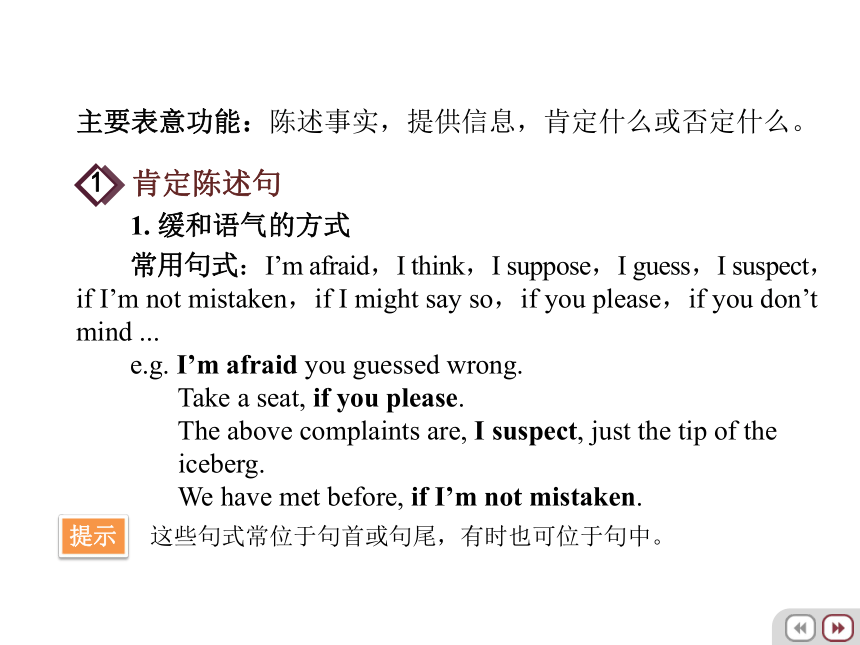
|
|
| 格式 | pptx | ||
| 文件大小 | 858.2KB | ||
| 资源类型 | 教案 | ||
| 版本资源 | 新概念英语 | ||
| 科目 | 英语 | ||
| 更新时间 | 2024-11-25 00:00:00 | ||
图片预览

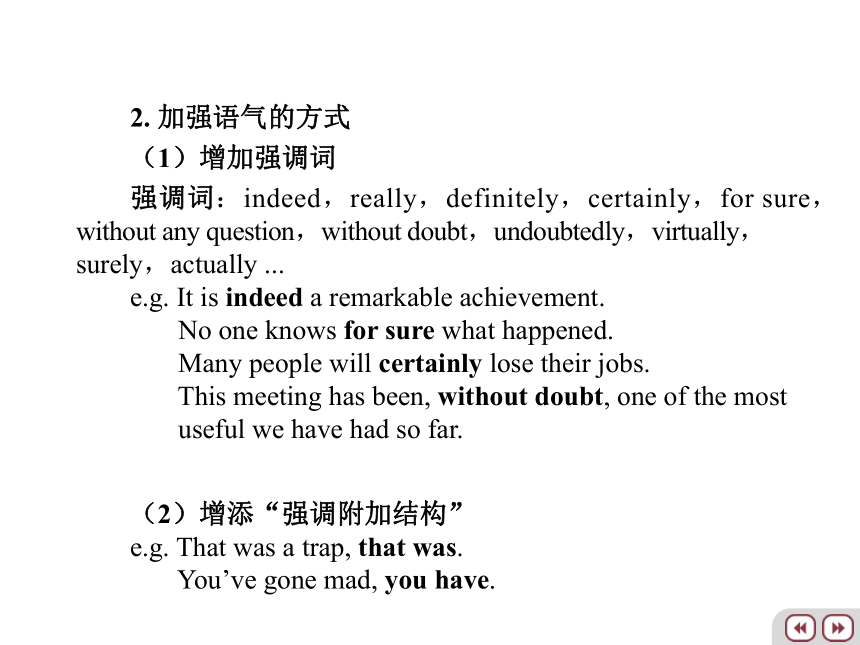


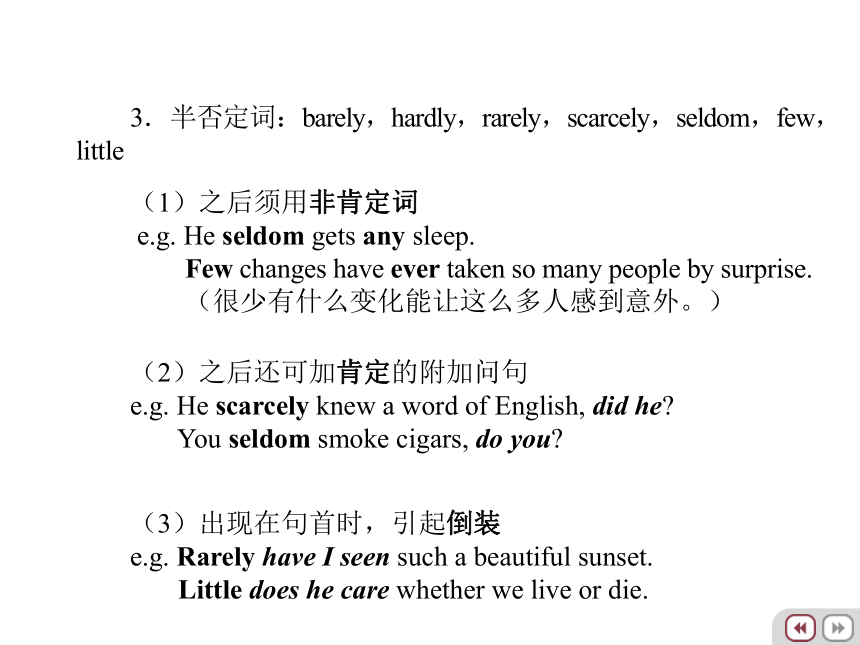



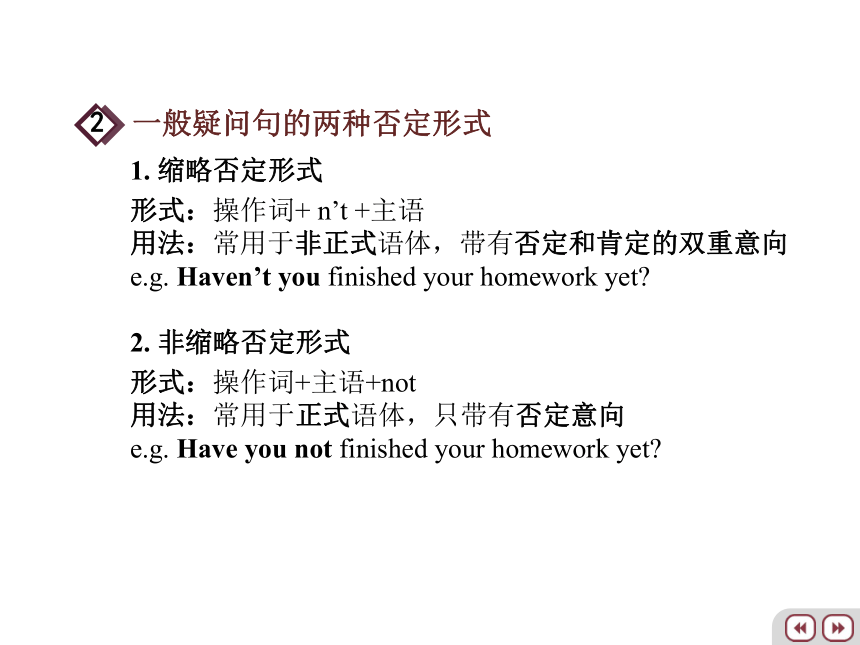
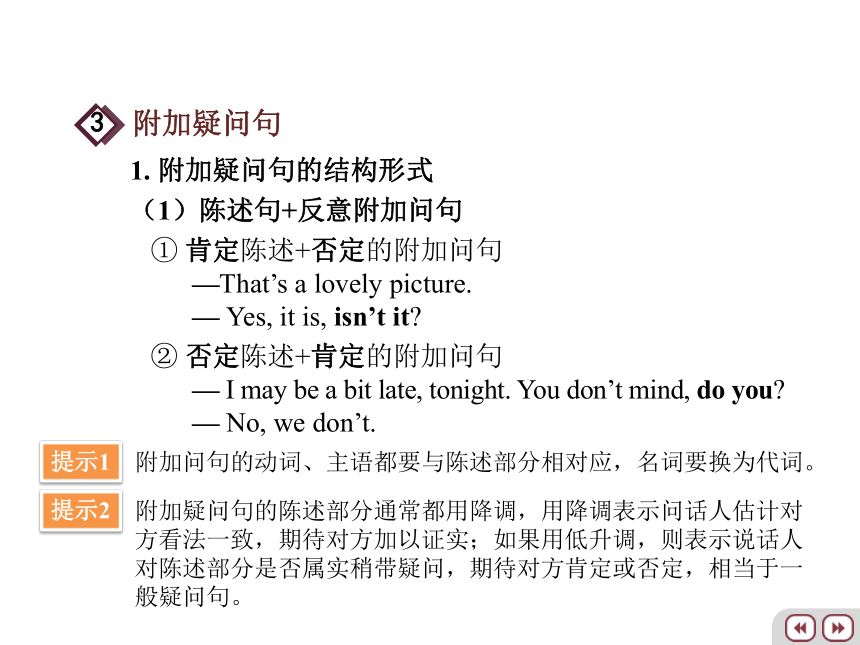
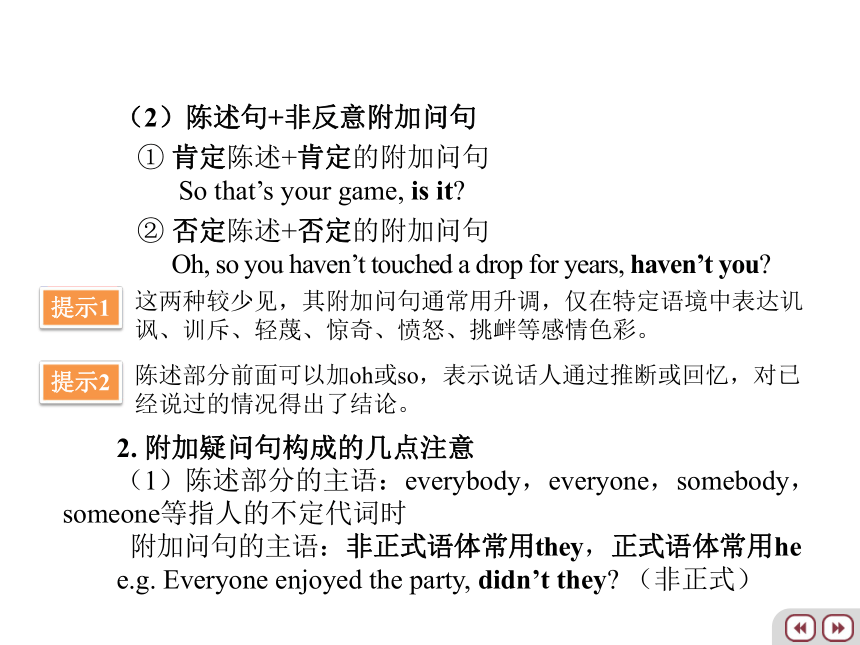

文档简介
(共36张PPT)
1. 缓和语气的方式
常用句式:I’m afraid,I think,I suppose,I guess,I suspect,if I’m not mistaken,if I might say so,if you please,if you don’t mind ...
e.g. I’m afraid you guessed wrong.
Take a seat, if you please.
The above complaints are, I suspect, just the tip of the
iceberg.
We have met before, if I’m not mistaken.
肯定陈述句
1
主要表意功能:陈述事实,提供信息,肯定什么或否定什么。
这些句式常位于句首或句尾,有时也可位于句中。
提示
2. 加强语气的方式
(1)增加强调词
强调词:indeed,really,definitely,certainly,for sure,without any question,without doubt,undoubtedly,virtually,surely,actually ...
e.g. It is indeed a remarkable achievement.
No one knows for sure what happened.
Many people will certainly lose their jobs.
This meeting has been, without doubt, one of the most
useful we have had so far.
(2)增添“强调附加结构”
e.g. That was a trap, that was.
You’ve gone mad, you have.
(3)采用“双重否定”手段
e.g. That kind of result is not impossible. (= quite possible)
She went to that place not infrequently. (= quite frequently)
(4)采用“修辞疑问句”
e.g. Isn’t it lovely weather today
= The weather is very lovely indeed.
Who doesn’t know that
= Everybody knows that.
(5)重读操作词
e.g. I `am telling you the truth — you must believe me.
“修辞疑问句”是形式上为疑问句而实际为陈述句的强调句式。
提示
典型否定词:not;no;nobody / nothing / nowhere等合成词
1. no-negation和not-negation常可交替使用
e.g. I have got no friends here.
= I haven’t got any friends here.
2. no-negation和not-negation在某些语境中含义不同
e.g. It is not a joke. (这不是笑话。)
It is no joke. (这可不是开玩笑的事儿。)
He is not a fool. (他不是傻瓜。)
He is no fool. (他才不傻哩 / 他很精明。)
否定陈述句
2
no = not any / not a
提示
3.半否定词:barely,hardly,rarely,scarcely,seldom,few,little
(1)之后须用非肯定词
e.g. He seldom gets any sleep.
Few changes have ever taken so many people by surprise.
(很少有什么变化能让这么多人感到意外。)
(2)之后还可加肯定的附加问句
e.g. He scarcely knew a word of English, did he
You seldom smoke cigars, do you
(3)出现在句首时,引起倒装
e.g. Rarely have I seen such a beautiful sunset.
Little does he care whether we live or die.
1. 肯定词(Assertive Words)
常见肯定词:some,someone,something,somebody,somehow,somewhere,someplace,sometime(s),somewhat,one or the other,still,already,as well,too,to some extent ...
用法:通常用于肯定陈述句以及带有肯定意向的疑问句。
e.g. I have something for you. I made it myself.
She lost her purse somewhere in the park.
You have already seen the film, haven’t you
“Is it something for me ” asked Wilbur. (肯定的倾向性)
Would you like some chocolate cake (肯定的倾向性)
肯定词和非肯定词
1
备注
2. 非肯定词(Non-assertive Words)
常见非肯定词:any,anyone,anything,anybody,anyhow,anywhere,anyplace,ever,any more,any longer,yet,at all,either ...
用法1:常用于否定句、疑问句以及带有不确定口气的陈述句。
e.g. Nobody in my class has ever played online games.
Is there anyone in the room
Students who have any complaints should raise their hands.
用法2:常用于if引导的条件状语分句中。
e.g. Call me if you have any problems regarding your work.
If there were anything wrong, he would certainly let us know.
用法3:可以跟具有否定含义的副词、动词、介词及形容词连用。
e.g. She seldom says anything.
He denied that he had ever seen her.
I’d rather do it without anybody’s help.
I’m reluctant to give Philip any advice.
比较: Did somebody telephone last night
Did anybody telephone last night
在疑问句中用somebody,很可能暗示说话人期望有电话;而用anybody则不暗示这种期望。
提示
1. 缩略否定形式
形式:操作词+ n’t +主语
用法:常用于非正式语体,带有否定和肯定的双重意向
e.g. Haven’t you finished your homework yet
2. 非缩略否定形式
形式:操作词+主语+not
用法:常用于正式语体,只带有否定意向
e.g. Have you not finished your homework yet
一般疑问句的两种否定形式
2
1. 附加疑问句的结构形式
(1)陈述句+反意附加问句
① 肯定陈述+否定的附加问句
—That’s a lovely picture.
— Yes, it is, isn’t it
② 否定陈述+肯定的附加问句
— I may be a bit late, tonight. You don’t mind, do you
— No, we don’t.
附加疑问句
3
附加问句的动词、主语都要与陈述部分相对应,名词要换为代词。
附加疑问句的陈述部分通常都用降调,用降调表示问话人估计对方看法一致,期待对方加以证实;如果用低升调,则表示说话人对陈述部分是否属实稍带疑问,期待对方肯定或否定,相当于一般疑问句。
提示1
提示2
(2)陈述句+非反意附加问句
① 肯定陈述+肯定的附加问句
So that’s your game, is it
② 否定陈述+否定的附加问句
Oh, so you haven’t touched a drop for years, haven’t you
2. 附加疑问句构成的几点注意
(1)陈述部分的主语:everybody,everyone,somebody,someone等指人的不定代词时
附加问句的主语:非正式语体常用they,正式语体常用he
e.g. Everyone enjoyed the party, didn’t they (非正式)
这两种较少见,其附加问句通常用升调,仅在特定语境中表达讥讽、训斥、轻蔑、惊奇、愤怒、挑衅等感彩。
陈述部分前面可以加oh或so,表示说话人通过推断或回忆,对已经说过的情况得出了结论。
提示1
提示2
Somebody borrowed my pen yesterday, didn’t they (非
正式)
Everybody knows what he has to do, doesn’t he (正式)
Nobody wants to go there, does he (正式)
(2)陈述部分:seldom,hardly,never,rarely,few,little,nowhere,nothing等否定或半否定词
附加问句的动词:肯定形式
e.g. Bob rarely got drunk, did he
She seldom goes to the cinema, does she
(3)陈述部分:I’m ...结构
附加问句:aren’t I
e.g. I’m late, aren’t I
用they更常见,因为附加疑问句多用在非正式口语体中。
提示
(4)陈述部分的主句:I suppose,I think,I believe,I suspect,I imagine等结构
附加问句:常与that-分句中的主句和谓语动词保持对应,注意否定的转移
e.g. I suppose (that) he’s serious, isn’t he
I don’t think (that) she cares, does she
(语义上相当于I think that she doesn’t care.)
(5) 陈述部分:表“所有”含义的动词have
附加问句:have / do
陈述部分:不表“所有”而表其他含义的动词have
附加问句:do
陈述部分主句的主语是第一人称I / we +心理活动的动词。
这条规则可从语义的角度来考虑,因为这类句子的语义重心在从句,否定也被转移到从句上。
提示1
提示2
e.g. She has a new boyfriend, hasn’t she / doesn’t she
She had a good time yesterday, didn’t she
(6)祈使句的附加疑问句
祈使句是肯定的:附加问句常用will / won’t / would you
祈使句是否定的:附加问句通常只能用will you
e.g. Help me with this box, will you
Have a glass of beer, won’t you
Don’t be late, will you
(7)Let’s …, shall we 和Let us …, will you
e.g. Let’s stop here, shall we
Let us have a look at your book, will you
“祈使句+附加问句”通常用低升调,表示客气的请求、邀请等。
附加问句will you和won’t you用降调还可表示强烈的要求。
提示1
提示2
Let’s结构所建议或征求的事情要求说话者和听话者一起参与;Let us结构含义为“allow us”,不包括听话者在内,仅表示请求对方允许。
提示
“If not us, who If not now, when ” . These two questions are used as a ________.
A.
B.
C.
D.
sign of anger
call for action
refusal to change
denial of commitment
该题考查对句式交际功能的理解。“If not us, who If not now, when ”出自艾玛·沃森特为“他为她”(HeForShe)运动所做的一次演讲的结尾,她号召男性也参与女性主义运动。该句意为“若不是我们,那该是谁;若非现在,更待何时?”,其交际功能是用修辞疑问句的方式表达强烈的肯定意义,即呼吁“我们”“现在”应该采取行动,因此B为正确答案,A项“表示愤怒”、C项“拒绝改变”和D项“否认承诺”均不正确。
“若不是我们,那该是谁;若非现在,更待何时?”,上述两个疑问句用于__________。
Nobody heard him sing, ______
A.
B.
C.
D.
did one
did he
didn’t they
did they
该题考查附加问句。该题陈述部分的主语nobody为否定词,其反意附加问句部分应为肯定式,nobody作主语,正式语体中通常用he,非正式语体用they。该句多用于非正式语体,因此,D为正确答案。
没有人听见他唱歌,对吗?
When you have finished with that book, don’t forget to put it back on the shelf, ______
A.
B.
C.
D.
don’t you
do you
will you
won’t you
该题考查祈使句的附加问句的构成。该题主句部分为否定祈使句,其附加问句一般用will you以征询他人意愿,因此,C为正确答案。注意:如果祈使句为肯定句,那么附加问句既可用will you,也可用won’t you。该题与《教程》P327 Ex.28C第48题类似。
你看完那本书,别忘了把它放回书架,好吗?
Which of the following tag questions is INCORRECT
A.
B.
C.
D.
Carry this parcel for me, will you
Nobody wants to go there, does he
Few people know him, don’t they
Everything is ready, isn’t it
该题考查附加疑问句的构成。A句为“祈使句+附加问句”构成的附加疑问句,附加部分一般用will you,won’t you,would you;B句陈述部分带有nobody等否定词,所以附加问句部分的动词用肯定形式;C句陈述部分带有few等半否定词,附加问句部分应该用肯定形式do they,该句意为“很少有人认识他,对吗?”,因此C为答案。D句陈述部分的主语是everything等指物的不定代词,附加问句部分的主语只能用it。
下列哪个句子的附加问句部分不正确?
Which of the following is NOT an imperative sentence
A.
B.
C.
D.
I wish you could stay behind.
You will mind your own business!
Come and have dinner with us.
Let me drive you home, shall I
该题考查祈使句。现代英语有三种类型的祈使句:第二人称祈使句;第一人称祈使句以及第三人称祈使句。B、C为第二人称祈使句,C句为通常的形式,即祈使对象you不表示出来; B句为强调形式,祈使对象you表示出来,且需重读。D句为第一人称祈使句,这种祈使句以自己为祈使对象,以let为引导词,其后还可带附加问句。只有A句为陈述句,表达主观愿望,因此A为正确答案。
下列哪个句子不是祈使句?
Which of the following sentences is INCORRECT
A.
B.
C.
D.
How strange feelings they are!
How dare you speak to me like that!
What noise they are making!
What a mess we are in!
该题考查感叹句的构成。感叹句有两种类型,一种是以How开首,另一种是以What开首。以How开首的感叹句的基本模式为:How + adj. / adv. +主语+谓语;以What开首的感叹句的基本模式为:What + (a/an) + adj. + n. +主语+谓语,What开首的感叹句有时可以省略形容词。由此看来,只有A项不符合感叹句的结构形式,因此A为答案。
下列哪句话不正确
Which of the following sentences is a COMMAND
A.
B.
C.
D.
Beg your pardon.
Have a good time.
Never do that again!
What noise you are making!
该题考查对句式交际功能的理解。A句意为“请再说一遍”,表请求;B句意为“祝你玩得愉快”,表祝愿;D句意为“你发出的噪音太大了!”,表感叹。C项句意为“再也不要那样做了!”,表命令,因此C为正确答案。
下列哪句话表“命令”?
When you have finished with the book, don’t forget to return it to Tim,
A.
B.
C.
D.
do you
will you
don’t you
won’t you
该题考查附加疑问句的构成。主句don’t forget to return it to Tim为否定祈使句,其附加问句一般用will you以征询他人意愿,因此B为正确答案。
你看完这本书后,不要忘了还给蒂姆,好吗?
The sentence that expresses OFFER is .
A.
B.
C.
D.
I’ll get some drinks. What’ll you have
Does she need to book a ticket now
May I know your name
Can you return the book next week
该题考查疑问句的交际功能以及情态助动词的用法。A项用于第二人称特殊疑问句中的will表提议,该句意为“我要去买些饮料,你想喝什么?”,因此A为正确答案。B项为一般疑问句,询问是否“需要”做某事;C项和D项是may和can疑问句,为请求对方“许可”。
下面哪个句子表达“提议”?
She seldom goes to the theatre, ______
A.
B.
C.
D.
doesn’t she
does she
would she
wouldn’t she
该题考查附加疑问句的构成。附加疑问句的基本构成为:肯定的陈述句+否定的附加问句;否定的陈述句+肯定的附加问句。seldom为否定副词,该句为否定的陈述句,动词为一般现在时,因此附加问句需用一般现在时的肯定结构,因此B为正确答案。
她很少去看戏,对吗?
Which of the following words can NOT be used to complete “We’ve seen the film ____.”
A.
B.
C.
D.
before
recently
lately
yet
该题考查非肯定副词yet的用法。上述四个副词都可以用于现在完成体,但是yet为非肯定副词,常用在否定句和疑问句中,通常不能用在肯定句中,原句为肯定句,因此D为答案。其他副词均可用在肯定句中。
下列哪个词不能被用于完成“We’ve seen the film ____.”?
Who was coming to see me in my office this afternoon
A.
B.
C.
D.
you said
did you say
did you say that
you did say
该题考查插入语的用法及疑问句的语序问题。you say为插入成分,使用插入成分必须与整个句子的语法结构相符,该句为特殊疑问句,因此需用局部倒装。一个带有插入成分的句子在插入成分去掉后应仍为一个完整句子,C中的that为多余。因此B为正确答案。
你说过谁今天下午要来办公室见我?
本讲开始学习句法,主要介绍了陈述句、疑问句、祈使句、感叹句的结构形式及其主要表意功能。肯定陈述句的学习要掌握缓和语气和加强语气的常见方式,否定陈述句要掌握最典型的否定词not和no,熟悉半否定词及含有否定意义的限定词和不定代词。熟悉常见的非肯定词及相应的肯定词,肯定词常用于肯定陈述句以及带有肯定意向的疑问句,非肯定词常用于否定句、疑问句以及带有不确定口气的陈述句。重点掌握附加疑问句的结构形式,学习附加疑问句的构成时,关键是从语义和交际的角度考虑,同时注意语体的差异。现代英语祈使句有第二人称祈使句、第一人称祈使句以及第三人称祈使句这三种类型,熟悉使祈使句口气缓和的方式以及口气强硬的方式。表示强烈感情有多种多样的手段,一般都
用降调,最常见的What-型和How-型的感叹句需要注意语序。
1.
2.
3.
4.
5.
You’re an American.
She won’t be able to arrive on time.
I’d like to leave the windows open.
You are quite wrong.
You haven’t paid me yet.
You’re an American, I suppose.
I’m afraid she won’t be able to arrive on time.
I’d like to leave the windows open, if you don’t mind.
I’m sorry to say you are quite wrong.
Soften the following statements by adding whatever insertion
deemed appropriate.
You haven’t paid me yet, if I’m not mistaken.
6.
7.
8.
9.
10.
He smokes like a chimney.
I have never seen a queer man like him.
He will give you a lot of help.
That’s not true.
He won’t smoke again.
He smokes like a chimney, he does.
Never have I seen a queer man like him.
He will certainly give you a lot of help.
I’ll be hanged if that’s true.
Reinforce the following statements by whatever means that is
appropriate.
You won’t catch him smoking.
1.
2.
3.
4.
5.
6.
He wrote an account of the fire.
It burnt furiously.
That happened in London in 1666.
Fires broke out every night during the war.
Three inches of rain fell last night.
It is four miles from here to the station.
What did he write
How did it burn
When and where did that happen
How often did fires break out during the war
How much rain fell last night
How far is it from here to the station
7.
8.
9.
10.
It will only take you ten minutes to get there by car.
The Aswan Dam was built to provide a reservoir for the Nile valley.
An idea occurred to the members present while Benjamin Hall was speaking.
I believe he wants to be left alone.
How long will it take me to get there by car
Why was the Aswan Dam built / For what purpose was the Aswan Dam built
Who / Whom did an idea occur to while Benjamin Hall was speaking
What do you believe he wants to do
1.
2.
3.
4.
5.
6.
7.
8.
9.
Jane has to stay here all day, ___________
As far as I can remember, Tom used to live here, __________________
That’s your sister, ________
The pubs close at half past three, __________
He has his hair cut every month, __________
We ought to read this book, ______________________
You must have made a mistake, ___________________
Jack has coffee with breakfast, __________
They must have stayed at home last night, ______
______________________
doesn’t she
usedn’t he / didn’t he
isn’t it
don’t they
doesn’t he
oughtn’t we / shouldn’t we
mustn’t you / haven’t you
doesn’t he
mustn’t they / didn’t they
10.
11.
12.
13.
14.
15.
16.
17.
18.
19.
Everyone’s having a good time, __________
There’s nothing wrong, ________
Nothing can stop us now, ______
No one left here yesterday, ________
Someone turn that radio down, _________________
I’m older than you, ________
You must be hungry, _____________________
Birds rarely build nests in our garden, _________
Give me a hand, __________________
I don’t think you’ve done it, _________
aren’t they
is there
can it
did they
will they / won’t they
aren’t I
mustn’t you / aren’t you
do they
would you / will you
have you
20.
21.
22.
23.
24.
25.
One can’t be too modest, ______________
I suppose you know the meaning of the word, _________
Somebody tried to gatecrash (擅自入场), _________
If he did more work he’d be very good, ___________
Don’t forget to phone me, ________
Let’s go, ________
can one /can you
don’t you
didn’t they
wouldn’t he
will you
shall we
1. 缓和语气的方式
常用句式:I’m afraid,I think,I suppose,I guess,I suspect,if I’m not mistaken,if I might say so,if you please,if you don’t mind ...
e.g. I’m afraid you guessed wrong.
Take a seat, if you please.
The above complaints are, I suspect, just the tip of the
iceberg.
We have met before, if I’m not mistaken.
肯定陈述句
1
主要表意功能:陈述事实,提供信息,肯定什么或否定什么。
这些句式常位于句首或句尾,有时也可位于句中。
提示
2. 加强语气的方式
(1)增加强调词
强调词:indeed,really,definitely,certainly,for sure,without any question,without doubt,undoubtedly,virtually,surely,actually ...
e.g. It is indeed a remarkable achievement.
No one knows for sure what happened.
Many people will certainly lose their jobs.
This meeting has been, without doubt, one of the most
useful we have had so far.
(2)增添“强调附加结构”
e.g. That was a trap, that was.
You’ve gone mad, you have.
(3)采用“双重否定”手段
e.g. That kind of result is not impossible. (= quite possible)
She went to that place not infrequently. (= quite frequently)
(4)采用“修辞疑问句”
e.g. Isn’t it lovely weather today
= The weather is very lovely indeed.
Who doesn’t know that
= Everybody knows that.
(5)重读操作词
e.g. I `am telling you the truth — you must believe me.
“修辞疑问句”是形式上为疑问句而实际为陈述句的强调句式。
提示
典型否定词:not;no;nobody / nothing / nowhere等合成词
1. no-negation和not-negation常可交替使用
e.g. I have got no friends here.
= I haven’t got any friends here.
2. no-negation和not-negation在某些语境中含义不同
e.g. It is not a joke. (这不是笑话。)
It is no joke. (这可不是开玩笑的事儿。)
He is not a fool. (他不是傻瓜。)
He is no fool. (他才不傻哩 / 他很精明。)
否定陈述句
2
no = not any / not a
提示
3.半否定词:barely,hardly,rarely,scarcely,seldom,few,little
(1)之后须用非肯定词
e.g. He seldom gets any sleep.
Few changes have ever taken so many people by surprise.
(很少有什么变化能让这么多人感到意外。)
(2)之后还可加肯定的附加问句
e.g. He scarcely knew a word of English, did he
You seldom smoke cigars, do you
(3)出现在句首时,引起倒装
e.g. Rarely have I seen such a beautiful sunset.
Little does he care whether we live or die.
1. 肯定词(Assertive Words)
常见肯定词:some,someone,something,somebody,somehow,somewhere,someplace,sometime(s),somewhat,one or the other,still,already,as well,too,to some extent ...
用法:通常用于肯定陈述句以及带有肯定意向的疑问句。
e.g. I have something for you. I made it myself.
She lost her purse somewhere in the park.
You have already seen the film, haven’t you
“Is it something for me ” asked Wilbur. (肯定的倾向性)
Would you like some chocolate cake (肯定的倾向性)
肯定词和非肯定词
1
备注
2. 非肯定词(Non-assertive Words)
常见非肯定词:any,anyone,anything,anybody,anyhow,anywhere,anyplace,ever,any more,any longer,yet,at all,either ...
用法1:常用于否定句、疑问句以及带有不确定口气的陈述句。
e.g. Nobody in my class has ever played online games.
Is there anyone in the room
Students who have any complaints should raise their hands.
用法2:常用于if引导的条件状语分句中。
e.g. Call me if you have any problems regarding your work.
If there were anything wrong, he would certainly let us know.
用法3:可以跟具有否定含义的副词、动词、介词及形容词连用。
e.g. She seldom says anything.
He denied that he had ever seen her.
I’d rather do it without anybody’s help.
I’m reluctant to give Philip any advice.
比较: Did somebody telephone last night
Did anybody telephone last night
在疑问句中用somebody,很可能暗示说话人期望有电话;而用anybody则不暗示这种期望。
提示
1. 缩略否定形式
形式:操作词+ n’t +主语
用法:常用于非正式语体,带有否定和肯定的双重意向
e.g. Haven’t you finished your homework yet
2. 非缩略否定形式
形式:操作词+主语+not
用法:常用于正式语体,只带有否定意向
e.g. Have you not finished your homework yet
一般疑问句的两种否定形式
2
1. 附加疑问句的结构形式
(1)陈述句+反意附加问句
① 肯定陈述+否定的附加问句
—That’s a lovely picture.
— Yes, it is, isn’t it
② 否定陈述+肯定的附加问句
— I may be a bit late, tonight. You don’t mind, do you
— No, we don’t.
附加疑问句
3
附加问句的动词、主语都要与陈述部分相对应,名词要换为代词。
附加疑问句的陈述部分通常都用降调,用降调表示问话人估计对方看法一致,期待对方加以证实;如果用低升调,则表示说话人对陈述部分是否属实稍带疑问,期待对方肯定或否定,相当于一般疑问句。
提示1
提示2
(2)陈述句+非反意附加问句
① 肯定陈述+肯定的附加问句
So that’s your game, is it
② 否定陈述+否定的附加问句
Oh, so you haven’t touched a drop for years, haven’t you
2. 附加疑问句构成的几点注意
(1)陈述部分的主语:everybody,everyone,somebody,someone等指人的不定代词时
附加问句的主语:非正式语体常用they,正式语体常用he
e.g. Everyone enjoyed the party, didn’t they (非正式)
这两种较少见,其附加问句通常用升调,仅在特定语境中表达讥讽、训斥、轻蔑、惊奇、愤怒、挑衅等感彩。
陈述部分前面可以加oh或so,表示说话人通过推断或回忆,对已经说过的情况得出了结论。
提示1
提示2
Somebody borrowed my pen yesterday, didn’t they (非
正式)
Everybody knows what he has to do, doesn’t he (正式)
Nobody wants to go there, does he (正式)
(2)陈述部分:seldom,hardly,never,rarely,few,little,nowhere,nothing等否定或半否定词
附加问句的动词:肯定形式
e.g. Bob rarely got drunk, did he
She seldom goes to the cinema, does she
(3)陈述部分:I’m ...结构
附加问句:aren’t I
e.g. I’m late, aren’t I
用they更常见,因为附加疑问句多用在非正式口语体中。
提示
(4)陈述部分的主句:I suppose,I think,I believe,I suspect,I imagine等结构
附加问句:常与that-分句中的主句和谓语动词保持对应,注意否定的转移
e.g. I suppose (that) he’s serious, isn’t he
I don’t think (that) she cares, does she
(语义上相当于I think that she doesn’t care.)
(5) 陈述部分:表“所有”含义的动词have
附加问句:have / do
陈述部分:不表“所有”而表其他含义的动词have
附加问句:do
陈述部分主句的主语是第一人称I / we +心理活动的动词。
这条规则可从语义的角度来考虑,因为这类句子的语义重心在从句,否定也被转移到从句上。
提示1
提示2
e.g. She has a new boyfriend, hasn’t she / doesn’t she
She had a good time yesterday, didn’t she
(6)祈使句的附加疑问句
祈使句是肯定的:附加问句常用will / won’t / would you
祈使句是否定的:附加问句通常只能用will you
e.g. Help me with this box, will you
Have a glass of beer, won’t you
Don’t be late, will you
(7)Let’s …, shall we 和Let us …, will you
e.g. Let’s stop here, shall we
Let us have a look at your book, will you
“祈使句+附加问句”通常用低升调,表示客气的请求、邀请等。
附加问句will you和won’t you用降调还可表示强烈的要求。
提示1
提示2
Let’s结构所建议或征求的事情要求说话者和听话者一起参与;Let us结构含义为“allow us”,不包括听话者在内,仅表示请求对方允许。
提示
“If not us, who If not now, when ” . These two questions are used as a ________.
A.
B.
C.
D.
sign of anger
call for action
refusal to change
denial of commitment
该题考查对句式交际功能的理解。“If not us, who If not now, when ”出自艾玛·沃森特为“他为她”(HeForShe)运动所做的一次演讲的结尾,她号召男性也参与女性主义运动。该句意为“若不是我们,那该是谁;若非现在,更待何时?”,其交际功能是用修辞疑问句的方式表达强烈的肯定意义,即呼吁“我们”“现在”应该采取行动,因此B为正确答案,A项“表示愤怒”、C项“拒绝改变”和D项“否认承诺”均不正确。
“若不是我们,那该是谁;若非现在,更待何时?”,上述两个疑问句用于__________。
Nobody heard him sing, ______
A.
B.
C.
D.
did one
did he
didn’t they
did they
该题考查附加问句。该题陈述部分的主语nobody为否定词,其反意附加问句部分应为肯定式,nobody作主语,正式语体中通常用he,非正式语体用they。该句多用于非正式语体,因此,D为正确答案。
没有人听见他唱歌,对吗?
When you have finished with that book, don’t forget to put it back on the shelf, ______
A.
B.
C.
D.
don’t you
do you
will you
won’t you
该题考查祈使句的附加问句的构成。该题主句部分为否定祈使句,其附加问句一般用will you以征询他人意愿,因此,C为正确答案。注意:如果祈使句为肯定句,那么附加问句既可用will you,也可用won’t you。该题与《教程》P327 Ex.28C第48题类似。
你看完那本书,别忘了把它放回书架,好吗?
Which of the following tag questions is INCORRECT
A.
B.
C.
D.
Carry this parcel for me, will you
Nobody wants to go there, does he
Few people know him, don’t they
Everything is ready, isn’t it
该题考查附加疑问句的构成。A句为“祈使句+附加问句”构成的附加疑问句,附加部分一般用will you,won’t you,would you;B句陈述部分带有nobody等否定词,所以附加问句部分的动词用肯定形式;C句陈述部分带有few等半否定词,附加问句部分应该用肯定形式do they,该句意为“很少有人认识他,对吗?”,因此C为答案。D句陈述部分的主语是everything等指物的不定代词,附加问句部分的主语只能用it。
下列哪个句子的附加问句部分不正确?
Which of the following is NOT an imperative sentence
A.
B.
C.
D.
I wish you could stay behind.
You will mind your own business!
Come and have dinner with us.
Let me drive you home, shall I
该题考查祈使句。现代英语有三种类型的祈使句:第二人称祈使句;第一人称祈使句以及第三人称祈使句。B、C为第二人称祈使句,C句为通常的形式,即祈使对象you不表示出来; B句为强调形式,祈使对象you表示出来,且需重读。D句为第一人称祈使句,这种祈使句以自己为祈使对象,以let为引导词,其后还可带附加问句。只有A句为陈述句,表达主观愿望,因此A为正确答案。
下列哪个句子不是祈使句?
Which of the following sentences is INCORRECT
A.
B.
C.
D.
How strange feelings they are!
How dare you speak to me like that!
What noise they are making!
What a mess we are in!
该题考查感叹句的构成。感叹句有两种类型,一种是以How开首,另一种是以What开首。以How开首的感叹句的基本模式为:How + adj. / adv. +主语+谓语;以What开首的感叹句的基本模式为:What + (a/an) + adj. + n. +主语+谓语,What开首的感叹句有时可以省略形容词。由此看来,只有A项不符合感叹句的结构形式,因此A为答案。
下列哪句话不正确
Which of the following sentences is a COMMAND
A.
B.
C.
D.
Beg your pardon.
Have a good time.
Never do that again!
What noise you are making!
该题考查对句式交际功能的理解。A句意为“请再说一遍”,表请求;B句意为“祝你玩得愉快”,表祝愿;D句意为“你发出的噪音太大了!”,表感叹。C项句意为“再也不要那样做了!”,表命令,因此C为正确答案。
下列哪句话表“命令”?
When you have finished with the book, don’t forget to return it to Tim,
A.
B.
C.
D.
do you
will you
don’t you
won’t you
该题考查附加疑问句的构成。主句don’t forget to return it to Tim为否定祈使句,其附加问句一般用will you以征询他人意愿,因此B为正确答案。
你看完这本书后,不要忘了还给蒂姆,好吗?
The sentence that expresses OFFER is .
A.
B.
C.
D.
I’ll get some drinks. What’ll you have
Does she need to book a ticket now
May I know your name
Can you return the book next week
该题考查疑问句的交际功能以及情态助动词的用法。A项用于第二人称特殊疑问句中的will表提议,该句意为“我要去买些饮料,你想喝什么?”,因此A为正确答案。B项为一般疑问句,询问是否“需要”做某事;C项和D项是may和can疑问句,为请求对方“许可”。
下面哪个句子表达“提议”?
She seldom goes to the theatre, ______
A.
B.
C.
D.
doesn’t she
does she
would she
wouldn’t she
该题考查附加疑问句的构成。附加疑问句的基本构成为:肯定的陈述句+否定的附加问句;否定的陈述句+肯定的附加问句。seldom为否定副词,该句为否定的陈述句,动词为一般现在时,因此附加问句需用一般现在时的肯定结构,因此B为正确答案。
她很少去看戏,对吗?
Which of the following words can NOT be used to complete “We’ve seen the film ____.”
A.
B.
C.
D.
before
recently
lately
yet
该题考查非肯定副词yet的用法。上述四个副词都可以用于现在完成体,但是yet为非肯定副词,常用在否定句和疑问句中,通常不能用在肯定句中,原句为肯定句,因此D为答案。其他副词均可用在肯定句中。
下列哪个词不能被用于完成“We’ve seen the film ____.”?
Who was coming to see me in my office this afternoon
A.
B.
C.
D.
you said
did you say
did you say that
you did say
该题考查插入语的用法及疑问句的语序问题。you say为插入成分,使用插入成分必须与整个句子的语法结构相符,该句为特殊疑问句,因此需用局部倒装。一个带有插入成分的句子在插入成分去掉后应仍为一个完整句子,C中的that为多余。因此B为正确答案。
你说过谁今天下午要来办公室见我?
本讲开始学习句法,主要介绍了陈述句、疑问句、祈使句、感叹句的结构形式及其主要表意功能。肯定陈述句的学习要掌握缓和语气和加强语气的常见方式,否定陈述句要掌握最典型的否定词not和no,熟悉半否定词及含有否定意义的限定词和不定代词。熟悉常见的非肯定词及相应的肯定词,肯定词常用于肯定陈述句以及带有肯定意向的疑问句,非肯定词常用于否定句、疑问句以及带有不确定口气的陈述句。重点掌握附加疑问句的结构形式,学习附加疑问句的构成时,关键是从语义和交际的角度考虑,同时注意语体的差异。现代英语祈使句有第二人称祈使句、第一人称祈使句以及第三人称祈使句这三种类型,熟悉使祈使句口气缓和的方式以及口气强硬的方式。表示强烈感情有多种多样的手段,一般都
用降调,最常见的What-型和How-型的感叹句需要注意语序。
1.
2.
3.
4.
5.
You’re an American.
She won’t be able to arrive on time.
I’d like to leave the windows open.
You are quite wrong.
You haven’t paid me yet.
You’re an American, I suppose.
I’m afraid she won’t be able to arrive on time.
I’d like to leave the windows open, if you don’t mind.
I’m sorry to say you are quite wrong.
Soften the following statements by adding whatever insertion
deemed appropriate.
You haven’t paid me yet, if I’m not mistaken.
6.
7.
8.
9.
10.
He smokes like a chimney.
I have never seen a queer man like him.
He will give you a lot of help.
That’s not true.
He won’t smoke again.
He smokes like a chimney, he does.
Never have I seen a queer man like him.
He will certainly give you a lot of help.
I’ll be hanged if that’s true.
Reinforce the following statements by whatever means that is
appropriate.
You won’t catch him smoking.
1.
2.
3.
4.
5.
6.
He wrote an account of the fire.
It burnt furiously.
That happened in London in 1666.
Fires broke out every night during the war.
Three inches of rain fell last night.
It is four miles from here to the station.
What did he write
How did it burn
When and where did that happen
How often did fires break out during the war
How much rain fell last night
How far is it from here to the station
7.
8.
9.
10.
It will only take you ten minutes to get there by car.
The Aswan Dam was built to provide a reservoir for the Nile valley.
An idea occurred to the members present while Benjamin Hall was speaking.
I believe he wants to be left alone.
How long will it take me to get there by car
Why was the Aswan Dam built / For what purpose was the Aswan Dam built
Who / Whom did an idea occur to while Benjamin Hall was speaking
What do you believe he wants to do
1.
2.
3.
4.
5.
6.
7.
8.
9.
Jane has to stay here all day, ___________
As far as I can remember, Tom used to live here, __________________
That’s your sister, ________
The pubs close at half past three, __________
He has his hair cut every month, __________
We ought to read this book, ______________________
You must have made a mistake, ___________________
Jack has coffee with breakfast, __________
They must have stayed at home last night, ______
______________________
doesn’t she
usedn’t he / didn’t he
isn’t it
don’t they
doesn’t he
oughtn’t we / shouldn’t we
mustn’t you / haven’t you
doesn’t he
mustn’t they / didn’t they
10.
11.
12.
13.
14.
15.
16.
17.
18.
19.
Everyone’s having a good time, __________
There’s nothing wrong, ________
Nothing can stop us now, ______
No one left here yesterday, ________
Someone turn that radio down, _________________
I’m older than you, ________
You must be hungry, _____________________
Birds rarely build nests in our garden, _________
Give me a hand, __________________
I don’t think you’ve done it, _________
aren’t they
is there
can it
did they
will they / won’t they
aren’t I
mustn’t you / aren’t you
do they
would you / will you
have you
20.
21.
22.
23.
24.
25.
One can’t be too modest, ______________
I suppose you know the meaning of the word, _________
Somebody tried to gatecrash (擅自入场), _________
If he did more work he’d be very good, ___________
Don’t forget to phone me, ________
Let’s go, ________
can one /can you
don’t you
didn’t they
wouldn’t he
will you
shall we
同课章节目录
